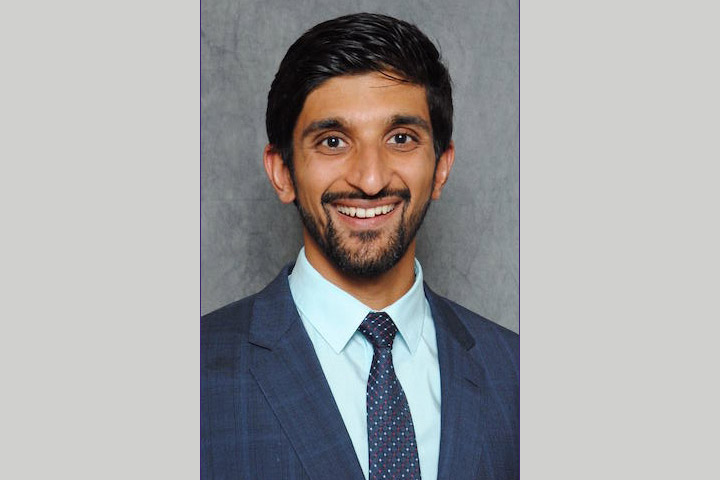Meet the Researcher: Arnav Mehta, M.D., Ph.D.

Early-career investigators pave the way for future breakthroughs in pancreatic cancer treatment.
At the 2022 AACR Special Conference: Pancreatic Cancer, Let’s Win supported the attendance of four early-career scientists. We will be featuring their important work over the next few months. This month we learn more about Dr. Arnav Mehta.
Mathematics to Help Understand COVID-19
In the spring of 2020, medical professionals had few clues about how best to treat the virus we now know as COVID-19. Every day they were learning new and often disastrous ways it affects the body, and they were scrambling to help keep people alive. But within a relatively short period of time, they figured out what treatments helped and also what treatments did little to nothing to help. Importantly, they also learned more about the virus itself, what made it tick and why it wreaked havoc on some and not on others. Much of that knowledge came from the labors of discovery scientists and physician–scientists whose special expertise shed light on what was killing people.
Arnav Mehta, M.D., Ph.D., of Massachusetts General Hospital (MGH), in Boston, Massachusetts, remembers that time all too well. It was at MGH that a multidisciplinary team of scientists identified the protein “signature” of severe COVID-19, which they described in a study published in Cell Reports Medicine. Their work produced copious and complex amounts of data, and Mehta, a postdoctoral researcher at the Broad Institute of MIT and Harvard (Cambridge, Massachusetts), was brought on board to help interpret and analyze that data. He used a technique called proteomics, which is basically the systematic identification and quantification of the complete complement of the proteome, or proteins, of a biological system—like a cell or bodily fluid—at a specific point in time. In short order, the team’s work helped identify mechanisms that might be contributing to reasons why some people with severe COVID-19 died, while others with disease just as severe survived.
“From my perspective, I wanted to help anywhere I could, and since I’m trained as a mathematician it was a way I could contribute and maybe help make a difference during that really awful time,” Mehta says.
Moving Forward
Mehta is no stranger to the rigors of medicine and research. Today, as a physician, he is bringing his clinical expertise to the treatment and care of patients with gastrointestinal (GI) cancers like gastroesophageal, colon, and pancreatic cancer. As a scientist, his research interests include immunology, cancer biology, single-cell genomics, and mathematics, applied for the discovery of new cancer therapies.
“When people ask me what I do, I always say that first and foremost I’m a doctor who has the privilege of taking care of cancer patients with disease in their gut or abdomen,” he explains. “As a scientist, I care about finding new therapies to treat these cancers. So I study human biology and do experiments on tissue samples derived from patient tumors.”
Medicine and science have embraced digitization to better understand the biology of a disease. And much more information is aggregated around different factors that make up a disease, including DNA, proteins, enzymes, cells, tissues, even ecosystems. It’s this proliferation of so-called “big data” that will yield a better understanding of the basic biology of many diseases. And that’s where Mehta’s training as a mathematician comes into play.
“There’s no getting around it that in our current era we now generate large data sets in the lab, and the question is what do we do with that data, how do we analyze it,” Mehta says. “Biology and mathematics are starting to converge. I’m a math guy, and I’m used to big data, large data sets. And I’m someone who wants to tackle and solve a problem. So my career path spans seeing patients, treating patients, and finding better ways to treat them using my expertise in other fields.”
Mehta completed his undergraduate studies at Duke University in mathematics and chemistry. He then completed his combined M.D. and Ph.D. degrees at the David Geffen School of Medicine at the University of California, Los Angeles, and the California Institute of Technology, respectively. He performed his Ph.D. work in the laboratory of Nobel laureate Dr. David Baltimore, during which time he discovered novel roles of microRNAs in hematopoietic stem cell function and in leukemia. Mehta subsequently completed his residency in internal medicine at Massachusetts General Hospital, followed by a combined hematology/oncology fellowship at MGH, Brigham and Women’s Hospital, and the Dana-Farber Cancer Institute (Boston).
As a fellow, he completed his postdoctoral research in the laboratories of Dr. Eric Lander and Dr. Nir Hacohen. During that time, he developed experimental and computational methods to study resistance mechanisms of pancreatic, gastroesophageal, and colorectal cancers using single-cell and spatial genomics technologies on patient samples and in vitro models. His work has been published in multiple journals, including Immunity, Cell Stem Cell, Nature Immunology, Nature Genetics, Nature Cancer, Cancer Discovery, Science Translational Medicine, and Cell Reports.
Mehta’s research interests also include studies of tumor cell plasticity and resistance mechanisms using cutting-edge single-cell genomics and lineage tracing technologies. He has received numerous awards, including the prestigious Doris Duke Charitable Foundation Physician Scientist Fellowship.
Hope for the Future
As a physician–scientist dealing with gastrointestinal cancers, Mehta knows too well that treatments like immunotherapy or targeted therapy that have shown efficacy in other cancers have not yet worked well in diseases like pancreatic cancer.
“There’s been an immunotherapy revolution, which has helped a lot of people, except those with GI cancers, like pancreas cancer, and except for small subsets of patients, targeted therapies haven’t worked that well either,” he says.
“Our patients with GI cancers can suffer horribly and they need better treatments. I want to make an impact where I can. I want to make an impact where it’s needed. I want to use what I know, and what I learn, to help these patients, because they so desperately need much better treatments and more choices.” Like all clinician–scientists, Mehta has a busy schedule. That doesn’t mean it’s all work, though. In his downtime, he enjoys spending time at home with his wife and young children, ages one and three. He and his wife are also training for triathlons. One of his favorite pastimes, though, may be occasionally giving in to the urge to be a couch potato and binge-watch seasons of episodic TV. “I’ve watched a lot of TV shows like Dynasty, and I probably shouldn’t even say that,” he laughs.






